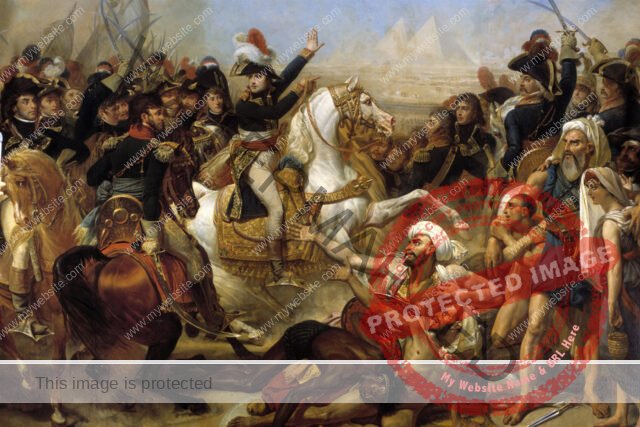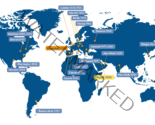GEW Briefs
Initial French Expeditions and Establishments
The first major French expedition to the Arab world was Napoleon’s invasion of Egypt in 1798. This invasion aimed to disrupt British trade routes to India and establish a French presence there. Although the French occupation was short-lived, it marked the beginning of increased French interest and intervention in the Arab world.
France’s second colonial empire was founded in Algeria in 1830 after losing most of its first empire in the Americas. The conquest of Algeria was followed by establishing protectorates in Tunisia in 1881 and Morocco in 1912. France also ruled over Syria and Lebanon between 1920 and 1946 after the partitioning of the Ottoman Empire following World War I.
Impact of French Colonial Policy on Arab Societies
The French pursued cultural assimilation policies in their colonies to spread the French language, education, and values. This led to the breakdown of traditional Arab societies and the imposition of European social and cultural norms.
In Algeria, the French followed a “divide and rule” policy, exploiting ethnic and religious divisions between Arab and Berber populations to consolidate control. The French also confiscated assets of Islamic foundations and exiled dissenting religious leaders.
Economic Exploitation and Resource Management
Perceived economic and strategic interests mainly drove France’s colonial policies. In Algeria, the French encouraged European settler colonialism and the appropriation of land, reducing much of the native peasantry to poverty.
The French also exploited natural resources in their colonies, such as phosphates in Morocco, which were mined with local labor under poor conditions. Agricultural production was oriented towards exports to meet French needs rather than local development.
Cultural and Educational Influences
The French aimed to spread their language and culture through education in the colonies. In Algeria, they dismantled the traditional Muslim education system and replaced it with French schools to “conquer Algerian minds.” This created an elite that was educated in the French system but alienated from their culture.
In Morocco, the French established a system of European schools for settlers and Franco-Arabic schools for the local population, aiming to produce an elite educated in the French tradition.
Resistance and Nationalist Movements in the Arab Region
French colonial rule faced persistent resistance and nationalist movements across the Arab world. In Algeria, figures like Amir Abd al-Qadir led armed insurrections against the French in the 1830s-1840s. The Algerian War for Independence from 1954-1962 eventually led to French withdrawal.
In Syria and Lebanon, the French faced numerous revolts against their mandate rule in the 1920s from Arab nationalist and Islamic movements. Protests over slow French withdrawal in 1945 were met with violent repression.
Diplomatic Relations and Early Treaties
France’s establishment of protectorates and mandates in the Arab world was shaped by international diplomacy and treaties—the Sykes-Picot Agreement of 1916 divided Ottoman territories into British and French spheres of influence.
The Treaty of Fez in 1912 made Morocco a French protectorate, while the San Remo Conference of 1920 granted France mandates over Syria and Lebanon.
Role of Religion in Colonial Governance
Religion played a complex role in French colonial policies. While the French officially separated church and state, they sought to control Islam in their colonies through policies like replacing religious leaders and monitoring mosques.
In Algeria, the French initially tried to dismantle Islamic institutions before shifting to a policy of co-opting them to reinforce colonial rule. In Morocco and Lebanon, the French made concessions to religious authorities to secure their cooperation.
Decolonization Processes Pre-1958
The decolonization process began in the Arab world after World War II amid a global anti-colonial movement. Syria became independent in 1946 after the French were forced to withdraw due to nationalist uprisings.
Morocco and Tunisia gained independence in North Africa in 1956 following prolonged negotiations with France. However, the Algerian War dragged on until 1962 due to fierce French resistance to relinquishing their oldest major colony.
Transition to Post-Colonial Diplomacy
Even after granting independence, France sought to maintain influence and strategic interests in its former Arab colonies through economic, cultural, and military ties. However, colonialism’s legacies created tensions that complicated France’s relations with the newly independent Arab states.
In summary, France’s colonial legacy in the Arab world was shaped by its initial expeditions for economic and strategic gain, policies of cultural assimilation and resource exploitation, and prolonged struggles against anti-colonial resistance movements. While granting independence, France aimed to preserve its interests through post-colonial diplomacy amid the complicated aftermath of colonial rule.
References
[1] https://www.encyclopedia.com/history/encyclopedias-almanacs-transcripts-and-maps/french-colonialism-middle-east
[2] https://www.thecairoreview.com/essays/the-paradox-of-arab-france/
[3] https://arabcenterdc.org/resource/the-colonial-legacy-in-the-arab-world-health-education-and-politics/
[4] https://www.marxists.org/subject/arab-world/lutsky/ch02.htm
[5] https://academic.oup.com/california-scholarship-online/book/18905/chapter-abstract/177239614?redirectedFrom=fulltext
[6] https://hal.science/hal-01316088/document
[7] https://dergipark.org.tr/tr/download/article-file/3547050
[8] https://scholar.valpo.edu/cgi/viewcontent.cgi?article=1730&context=cus
[9] https://pure.uva.nl/ws/files/1108199/61298_08.pdf
[10] https://fcc.uchicago.edu/the-franco-arab-thing-exploring-centuries-of-franco-arab-relations/
[11] https://digitalcommons.bucknell.edu/cgi/viewcontent.cgi?article=1452&context=honors_theses
[12] https://courses.lumenlearning.com/suny-hccc-worldhistory2/chapter/france-in-the-middle-east/
[13] https://nomadit.co.uk/conference/africaknows/paper/57571
[14] https://www.e-ir.info/2017/06/16/informal-colonialism-of-egyptology-the-french-expedition-to-the-security-state/
[15] https://link.springer.com/chapter/10.1007/978-3-030-70825-2_9
[16] https://read.dukeupress.edu/french-historical-studies/article-abstract/43/4/537/166751/The-Price-of-ViolenceMoney-the-French-State-and?redirectedFrom=fulltext



MOST COMMENTED
Book Release / Fiction / Literature / media / Podcast
Isabelle Richard’s Novel, “The Unwritten Chapter” + Podcast Review
Current Affairs / Geopolitics / Gulf / International Affairs / Iran / Islam / Israel / media / MENA Matters / Middle East / New Release / Our Books / Podcast
The Blackmail Doctrine: Trump, Israel, And The Arab Compliance + PODCAST REVIEW
Book Release / Current Affairs / Geopolitics / MENA Matters
La doctrine du chantage: Trump, Israël et la soumission des États arabes
Analyses & Commentaries / GEW Intelligence Unit / Research Paper
Iran’s Enduring Resilience: Why a Decisive Defeat is Elusive, Even with US Intervention
France / Littérature / media / Nos livres / Podcast
Le cercle restreint (Roman) : Présentation+ Podcast critique
Essais / Gulf / Iran / Israel / media / Podcast
La forteresse résiliente: Évaluer la puissance de l’Iran dans un contexte de confrontation moderne ( + critique en podcast)
Book Release / Collection: Geopolitics / Current Affairs / Iran / Podcast
The Resilient Fortress: Assessing Iran’s Power In A Modern Confrontation